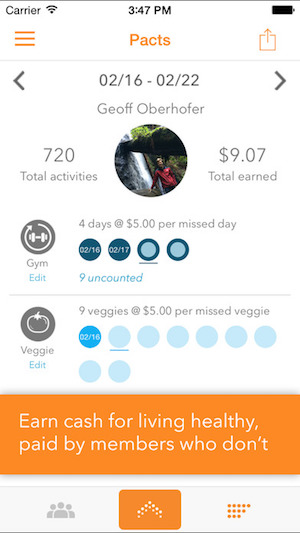 When we broke the news in July of the shutdown of Pact, a startup that aimed to motivate users to go to the gym with monetary carrots and sticks, we noted that the reasons for the company's demise weren't readily apparent. Now a new missive from the FTC (first spotted by Gizmodo) is shedding some additional — and, truth be told, not very flattering — light on that story.
When we broke the news in July of the shutdown of Pact, a startup that aimed to motivate users to go to the gym with monetary carrots and sticks, we noted that the reasons for the company's demise weren't readily apparent. Now a new missive from the FTC (first spotted by Gizmodo) is shedding some additional — and, truth be told, not very flattering — light on that story.
While users were promised monetary payouts for completing their workout goals and fees for missing them, Pact seems to have let a lot of users down on both ends of the bargain, with the FTC fielding complaints from "at least tens of thousands of consumers" who claimed "that they were charged rather than paid for completing pacts," according to the commission's blog.
The complaints mostly seem to be from users who, for whatever reason, weren't able to log workouts that they completed, and were charged despite filing complaints with Pact. Others tried to cancel their accounts or even delete the app, but kept getting billed.
“Consumers who used this app expected the defendants to pay them rewards when they achieved their health-related goals, and to charge them only when they did not,” Tom Pahl, acting director of the FTC's Bureau of Consumer Protection, said in a statement. “Unfortunately, even when consumers held up their end of the deal, Pact failed to make good on its promises.”
The settlement with the FTC requires Pact to pay $948,788 back to individuals who were unfairly charged. The full judgement — for $1.5 million — has been suspended based on the defendant's financial condition. The refunds will be delivered via the users' PayPal accounts, and Pact will be required to pay the full amount if it's found to have misrepresented its financial status.
According to the commission, Pact is up on two different charges: a larger umbrella charge of "unfair and deceptive practices" under the FTC Act, and a more specific charge of violating the Restore Online Shoppers Confidence Act (ROSCA). This act deals specifically with so-called "negative options," where customers are billed for a product or service on an "opt out" rather than "opt in" basis.
MobiHealthNews has been covering Pact since it first launched in December 2012 under the name GymPact, and we were the first to break news of the app shutting down this summer.
It's unclear to what extent, if at all, the FTC judgement was the cause of the company's shut down. Considering that the judgement was suspended because of the company's financial hardship, it seems likely that Pact was already in trouble even before the investigation. As before, we've reached out to the Pact team for comment and will update this story if we hear back.
While health apps often think of the FDA as the primary agency they answer to, the FTC has gone after companies in the digital health space with some regularity over the years, including a smartphone breathalyzer, a "vision improvement app," a blood pressure app, two mole analyzer apps, a brain training game, and mobile EHR Practice Fusion. Last year the FTC even created a tool for health app makers to help them understand what regulations they're subject to.

















